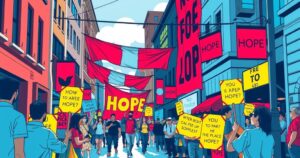Mozambique’s Path to Peace: Political Turbulence and Economic Challenges

Mozambique has faced significant challenges since the civil war, with multiparty elections in 1994 marking a transition to peace. The political landscape is characterized by the rivalry between Frelimo and Renamo. While economic growth surged, it has not benefitted many citizens equally, leading to political tensions and hostilities. The controversial 2024 elections raised concerns about electoral integrity, displaying a continued need for reform and dialogue between the government and opposition parties.
The civil strife in Mozambique, which erupted in 1977, saw two principal factions, the Frelimo party and the Renamo insurgents, fighting for control over the nation. A pivotal moment arrived in October 1994 when multiparty elections were conducted, marking a significant milestone towards peace. Despite Frelimo’s historic Marxist-Leninist ideology, the party embraced crucial reforms such as privatizing the economy and adopting a new constitution promoting multiparty governance. Renamo transformed from a pariah group into a recognized political entity, exemplified by leader Afonso Dhlakama’s inclusion as a presidential candidate during the elections, which were declared free and fair by international observers. However, concerns lingered about land mines left over from war and challenges in demobilizing combatants.
In the subsequent years, Mozambique faced a multitude of natural disasters that prompted economic reforms; however, the growth was not equitably distributed among its citizens. Rising discontent led to a resurgence of hostilities, resulting in the cancellation of the 1992 peace accord and renewed fighting in 2013. A new peace agreement was struck in September 2014, allowing for the presidential elections that year, in which Frelimo maintained power under Filipe Nyusi despite a decline in their legislature majority.
The political climate continued to present challenges, marked by clashes between government forces and Renamo, particularly in the region of Cabo Delgado, where insurgent activity linked to the Islamic State led to significant instability. By 2024, electoral tensions amplified with accusations of voter manipulation and violence against opposition figures, culminating in the controversial victory of Frelimo’s candidate, Daniel Chapo, amid protests from Renamo and other parties against alleged electoral malfeasance. Ultimately, ongoing economic challenges, natural disasters, and political volatility defined Mozambique’s journey post-1994, necessitating continued efforts for peace and stability in the region.
Mozambique’s civil conflict, primarily between Frelimo and Renamo, has been a defining issue since the country’s independence in 1975. The war officially ended with a peace agreement in 1992, leading to the first multiparty elections in 1994. The following decades saw a mixture of tensions, economic challenges, and natural disasters that have impacted the nation’s growth, political stability, and social equity. Recent years have brought renewed violence, particularly in Cabo Delgado, highlighting the ongoing struggle for peace and development.
In conclusion, Mozambique’s journey from civil war to relative peace has been fraught with challenges, including political strife, economic disparity, and natural disasters. While significant milestones have been achieved, such as the establishment of multiparty democracy and ongoing peace negotiations, the sustainability of these reforms remains in question. The allegations of electoral fraud in the latest elections further underscore the fragility of the political landscape and the need for ongoing dialogue and reform to foster long-lasting stability and reconciliation in Mozambique.
Original Source: www.britannica.com







